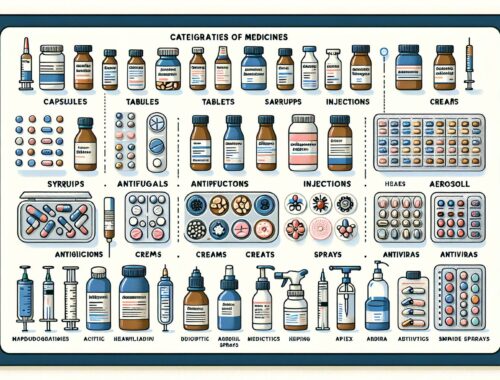
Understanding the Different Types of Medicines
Medicines play a crucial role in treating illnesses and improving our overall health. They are specifically formulated to target diseases, alleviate symptoms, and restore normal bodily functions. There are various types of medicines available, each serving a unique purpose and mechanism of action. Let’s explore these different types of medicines and how they work.
1. Analgesics
Analgesics, commonly known as painkillers, are medications designed to relieve pain. They can be classified into two main types: non-opioid analgesics and opioid analgesics. Non-opioid analgesics, such as acetaminophen and nonsteroidal anti-inflammatory drugs (NSAIDs), work by blocking pain signals and reducing inflammation. On the other hand, opioid analgesics, including morphine and oxycodone, bind to opioid receptors in the brain and spinal cord, resulting in pain relief.
2. Antibiotics
Antibiotics are medications used to treat bacterial infections. They work by either killing the bacteria directly or inhibiting their growth. Different antibiotics target specific types of bacteria, and they can be classified into different groups, such as penicillins, cephalosporins, and macrolides. It’s important to note that antibiotics are ineffective against viral infections, such as the common cold or flu.
3. Antivirals
Unlike antibiotics, antiviral medications are specifically designed to treat viral infections. They work by inhibiting the replication and spread of viruses within the body. Antivirals can be effective against various viruses, such as influenza, herpes simplex, and human immunodeficiency virus (HIV). These medications can help reduce symptoms, speed up recovery, and prevent the virus from spreading to others.
4. Antidepressants
Antidepressants are medications prescribed to individuals experiencing depression, anxiety disorders, or certain mood disorders. They work by balancing chemicals in the brain, such as serotonin, dopamine, and norepinephrine, which are responsible for regulating mood and emotions. Common types of antidepressants include selective serotonin reuptake inhibitors (SSRIs), serotonin-norepinephrine reuptake inhibitors (SNRIs), and tricyclic antidepressants (TCAs).
5. Antacids
Antacids are medications used to relieve symptoms of indigestion, heartburn, and stomach ulcers. They work by neutralizing excess stomach acid, reducing irritation, and providing relief. Antacids are available over-the-counter and typically contain ingredients like magnesium hydroxide, calcium carbonate, or aluminum hydroxide.
Conclusion
Medicines come in various forms and serve different purposes in treating diseases and improving overall well-being. From relieving pain to fighting infections and managing mental health conditions, each type of medicine has its unique mechanism and benefits. It’s essential to understand the specific type of medicine prescribed by healthcare professionals and follow their instructions carefully. Remember, medicines should always be taken as directed, and consulting a healthcare professional is crucial for a proper diagnosis and appropriate treatment plan.
You May Also Like

Exploring the Different Types of Medicines
March 20, 2024
#Understanding the Different Types of Medicines
December 20, 2023

